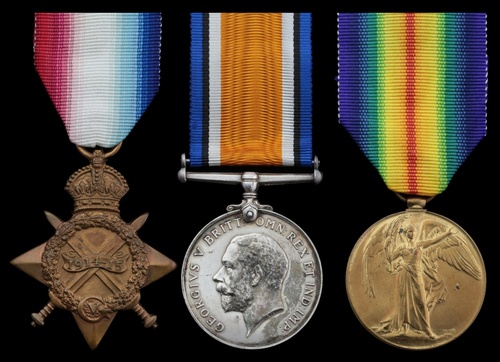
Auction: 22103 - Orders, Decorations and Medals VII - e-Auction
Lot: 403
Three: Captain T. H. Davies, 11th Battalion (2nd Gwent), South Wales Borderers, late 15th Battalion, London Regiment (Civil Service Rifles), a '17 March Man' who saw action at Aubers Ridge, Festubert and Loos before being commissioned into the South Wales Borderers and commended for his actions at Mametz Wood, finally dying as a result of injuries suffered during gas attack on 6 October 1919
1914-15 Star (3031. Pte. T. H. Davies, 15-Lond. R.); British War and Victory Medals (Capt. T. H. Davies.), contact marks, pitting, very fine (3)
Thomas Howell Davies was born at St Clears, Carmarthenshire, in 1886 the son of Thomas and Anne Davies of Llan-Y-Gorse, Hendreladis, Swansea Valley. On the outbreak of war he was working as a School Teacher at Clifton Road Boys School, Southall, Middlesex. Enlisting early on 1 September 1914 with the 15th Battalion, London Regiment (Civil Service Rifles) as a Private. It was with this rank that Davies joined the war as one of the famous '17 March Men', those who joined in that first posting on 17 March 1915.
Here they were engaged at the Battles of Aubers Ridge, Festubert and later Loos and though their role in these battles was peripheral the time spent in the Hulluch and Hairpin trenches more than made up for it. Davies was to leave the Civil Service Rifles before their move to Palestine, being commissioned 2nd Lieutenant with the 11th Battalion (2nd Gwent), South Wales Borderers on 23 January 1916.
Joining the 11th Battalion in France on 29 February 1916 he was to serve with them during the bloody fighting at Mametz Wood. The first attack on 7 July failed with high losses, in the confused and tangled battle the artillery proved far less effective than elsewhere on the line and many German Machine Gun positions survived to hold up the advance. Nevertheless on the 10 July the South Wales Borderers managed to advance to the edge of the Wood though heavy pressure and a lack of progress in the rest of the line forced them to withdraw. Davies himself was one of those officers commended to the Brigadier commanding 115th Brigade for his actions during the fighting.
Promoted Lieutenant on 20 July 1917 around the time that the Battalion was engaged in the Battle of Passchendaele. He was still serving with them in fact when Sergeant Ivor Rees won his Victoria Cross at Pilkim Ridge. Davies was later promoted Captain on 20 July 1917, it was around this time that he was gassed and began to suffer from ill-effects, he was transferred to the 6th Battalion, South Wales borderers on 29 April 1918. Released from military duty on 16 January 1919 and confirmed in the rank of Captain at the same time Davies health continued to decline. He died on 6 October 1919 to great sadness from the entire community with the Labour Voice on 11 October 1919 reporting:
'Thousands of people attended the funeral and lined the route from the home of the deceased to the Churchyard. The cortege was headed by the band of the composite battalion of the S.W.B. band stationed at Brecon who played the "Dead March" en-route. This was followed by a firing party marching with arms reversed. The local branch of the Discharged and Demobilised S. and S. [Soldiers and Sailors] followed and acted as bearers. The ministers were the Revds. J Emlyn Jones (Pastor); B Jones (B) Trehafod; Dr. Dan Evans (Hawen); D J Davies and Daniel Aubrey.
At the Church, the troops and discharged men formed a guard of honour. At the graveside the firing party stood with arms reversed, and afterwards fired three volleys. Bayonets were then fixed and with arms at the "present", the "Last Post" was sounded by buglers of the SWB.'
Davies was survived by his wife Edith and son Newman, he is buried at Ystradgynlais (St. Cynog) Churchyard. His son later served with the Royal Army Service Corps and was killed on 5 June 1940 during the Fall of France; sold together with copied research including M.I.C., Commonwealth War Graves details and service papers as well as extracts from the Labour Voice newspaper, The History of the South Wales Borderers and Civil Service Rifles in the Great War.
Subject to 20% VAT on Buyer’s Premium. For more information please view Terms and Conditions for Buyers.
Sold for
£280
Starting price
£100




